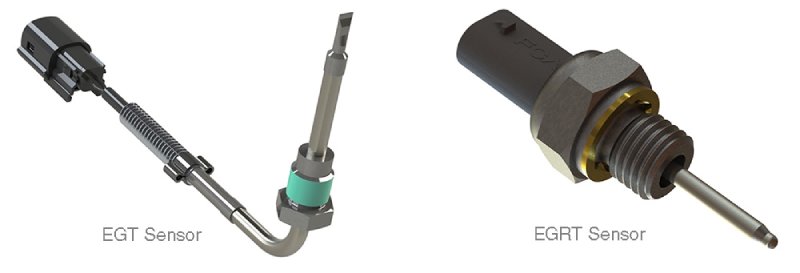Exhaust gas temperature (EGT) sensors monitor exhaust gas temperature for emissions control, fuel consumption control, and fuel/air ratio optimization. EGT sensors also help test the operation of certain after-treatment components, such as:
- Diesel oxidation catalyst (DOC)
- Selective catalytic reduction (SCR)
- Gasoline particulate filters (GPF)
- Diesel particulate filters (DPF)
Made from resistance temperature detectors (RTDs) or thermocouples, EGT sensors measure the exhaust stream’s temperature to prevent the engine from exceeding its rated operating temperature, which may cause permanent damage to engine components. One or more EGT sensors may be used depending on the complexity of monitoring required.
At SMP Engineered Solutions, our temperature sensors rely on several technologies, including thermistors, platinum resistive temperature devices, and thermocouples. Learn more about exhaust gas temperature sensors, the different types available, and how to spot a faulty EGT sensor.
How Do Exhaust Gas Temperature Sensors Work?
An EGT sensor measures exhaust gas temperatures and relays the data to the engine control unit (ECU) to protect the engine from overheating. Compact engines risk high-temperature conditions that can damage components. The EGT sensor detects temperature increases, signaling the ECU to reduce engine temperature through means such as increasing the fuel injected for the catalytic converter or reducing boost pressure in a turbocharged engine.
What Are the Different Types of Gas Temperature Sensor?
EGT sensors come in three main types: negative temperature coefficient (NTC), positive temperature coefficient (PTC), and active sensors. The difference between the first two is how they each measure temperature. For instance, an NTC sensor element has a low resistance when the exhaust gas temperature is high, and a high resistance when the temperature is low. PTC sensor elements are more popular and have a resistance that increases and decreases in line with the temperature.
Active EGT sensors are smart sensors with digital output (eg. CAN or SENT). They are based on thermocouple technology (type N). They consist of an electronics module and single or multiple measuring probes. They offer high accuracy, high-temperature resistance (>1000°C), and fast response time. They are the recommended solution for high-demanding, heavy-duty applications.
What Are the Symptoms of a Faulty EGT Sensor?
Faulty EGT sensors negatively impact the after-treatment system of a vehicle. A vehicle with a faulty EGT may exhibit the following symptoms:
- Increased fuel consumption: An EGT sensor that relays incorrect voltages to the ECU will slow the speed of the DPF regeneration process, causing increased fuel consumption and poor fuel efficiency.
- Check engine light: A faulty EGT sensor will cause the ECU to activate the check engine light on the instrument panel.
- Emissions test failures: Faulty EGT sensors may not always trigger a check engine light but can still cause the exhaust gas recirculation (EGR) system to malfunction. This can result in an emissions test failure.
- Unnecessary DPF regeneration: A faulty EGT sensor can result in unnecessary regeneration of the DPF, reducing the effectiveness of the DPF and inconveniencing the operator.
- Component failure: A faulty EGT may not adequately protect the engine from high temperatures, resulting in damage and premature failure of the internal engine and exhaust components.
Exhaust Gas Temperature Sensors From SMP Engineered Solutions
EGT sensors are essential for protecting the vehicle engine from over-temperature conditions. They measure exhaust gas temperatures and relay the data to the ECU, which can prevent overheating. It is critical to replace faulty EGT sensors to prevent increased fuel consumption, component failure, and poor operating conditions.
SMP Engineered Solutions offers a wide selection of EGT sensors to meet your specifications. We maintain ISO 9001, ISO 14001, and IATF 16949 certifications to deliver high-quality solutions for various industries. Contact us to discuss the ideal solution for your application.
